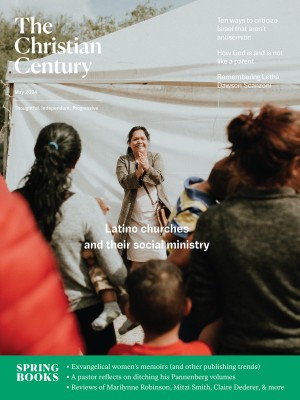Where are the children in liberation theologies?
Child advocate R. L. Stollar seeks to help people read the Bible in ways that protect and honor children.

The Kingdom of Children
A Liberation Theology
I was asked to preach at my daughter’s elementary school on Exodus 3:7–10, the story in which God appears to Moses in a burning bush, acknowledges the misery of the people, and promises to liberate them from their oppression. As I studied the text, I asked myself: Where are the children in this story? They’re suffering under oppression, I realized. God hears the voices of crying children, knows the pain of hurting children, and vows to free them. (They are also literally there in the Hebrew text, where God calls the Israelites “children of Israel.”) I felt I’d been fairly successful in applying a hermeneutic of child liberation theology.
What I hadn’t prepared for was the powerful public reading of the Exodus passage by a second grader—call her Ella. She was a bit nervous during the rehearsal, but when Ella read during the chapel service, she held the microphone with authority and read the story in as clear and powerful a voice as I’ve ever heard anyone read scripture. Here was a child narrating the story of oppressed children, proclaiming how God saw them and would liberate them. Ella embodied child liberation theology simply by being a child who brought God’s saving words to a room full of children, teachers, and parents.
Read our latest issue or browse back issues.
R. L. Stollar’s years-long writing and practice of child liberation theology has led to The Kingdom of Children. Stollar notes that there “are many types of liberation theology,” each of which is “about equipping and empowering groups of people to discover and speak about God on their own terms and with their own language.” Liberation theology is “a theology of self-determination” toward freedom from oppressive forces and structures. It is concerned with both reflection and praxis—the here and now of day-to-day life.
But, Stollar says, liberation theologies have tended to focus on suffering and marginalized adults. Where are the children in liberation theologies? While Stollar affirms (and interacts with) various theologies of childhood and child theologies, “the specific topic of child liberation theology has received very little attention.”
Stollar writes not just to fill a gap in theology. His introduction, cleverly and poignantly titled “Suffer the Children,” is an indictment of adults who have hurt, neglected, or simply ignored children. Children have suffered and still suffer from multiple forms of abuse, from school shootings, from forced child labor, and from ageist assumptions and practices that dishonor the fullness of their creation in God’s image. Stollar argues that Christians, as recipients of the message of Jesus and the Hebrew prophets, have a particular duty to love and honor children well.
The Kingdom of Children moves from a survey of our “anti-child world” to posing a set of questions that child liberation theology needs to answer. These include “How do we read the Bible in a way that better liberates, loves, and protects children?” and “What does it mean to center children in the way we read the Bible?”
Readers get to see Stollar practice what he calls for. He surveys the Bible’s “bad stories” (such as Abraham’s willingness to sacrifice Isaac) and “good stories” (such as Miriam, who functions as a “child critic of anti-child patriarchy”). Stollar’s exegesis combines his own insights with those of other compelling interpreters, demonstrating how biblical hermeneutics can (and must) be loving and liberating of children.
Several chapters explore theological themes, including the idea of God as a child, which undergirds the idea of children as “God-to-us.” As full bearers of the image of God, children have been and continue to be prophets, priests (understood by Stollar as teachers and leaders), theologians, and—most important—children. He provides an overview of child development theory aimed at preventing the inappropriate adultification of children.
While readers may find minutiae to push back on, I offer just one substantive critique of this book—although it’s one Stollar is aware of and seeks to mitigate to some extent. Namely, here is a full-length treatment of child liberation theology that is not written by or explicitly co-constructed with children. Stollar acknowledges the need for such work: “We must develop a child liberation theology such that children will be liberated to the point they can rise up and establish that theology themselves.” To this end, he ends each chapter with an “Including Children” section that gives reader-practitioners ways to involve and empower child liberation theologians who are children. Still, some of the best moments of The Kingdom of Children are when Stollar gives voice to children in the Bible, and hearing more voices of children today would help advance the book’s aims. This book may be a prolegomenon of sorts to a child liberation theology that is done more distinctly with and by children.
That’s not to subtract from how powerful and prophetic Stollar’s book is. Reading it is like reading Freire’s Pedagogy of the Oppressed or Gutiérrez’s A Theology of Liberation for the first time. It’s unputdownable, a compelling call not just to action but to a transformed life spent on behalf of others. Jesus said, “Unless you change and become like children, you will never enter the kingdom of heaven” (Matt. 18:3). Stollar shows us how to change, so we might follow God’s children into the kingdom.






